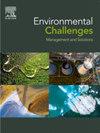Unraveling social-ecological constraints to the adoption of CMD-resistant cassava varieties in Thailand
Q2 Environmental Science
引用次数: 0
Abstract
Cassava Mosaic Disease (CMD) presents a critical challenge to cassava production in Thailand, leading to substantial yield reductions and threatening the livelihoods of smallholder farmers. Despite the availability and documented agronomic benefits of CMD-resistant cassava varieties, their adoption remains limited. This study employs the Social-Ecological Adoption Framework (SEAF) to systematically examine the social-ecological factors influencing adoption decisions among 359 farmers in Chaiyaphum Province. Using binary logistic regression analysis, the results, significant at the 0.05 level, indicate that household income, production costs, farmers’ knowledge of CMD, access to soft loans, and peer influence are key factors shaping adoption behavior. These findings highlight the necessity for integrated financial, educational, and institutional interventions to enhance the uptake of CMD-resistant varieties, fostering more sustainable cassava production systems in Thailand.
解开泰国采用抗cd木薯品种的社会生态限制
木薯花叶病(CMD)对泰国木薯生产构成重大挑战,导致产量大幅下降,并威胁到小农的生计。尽管抗cd木薯品种的可用性和有记录的农艺效益,但它们的采用仍然有限。本研究采用社会生态领养框架(SEAF),系统检视影响柴亚府359位农民领养决定的社会生态因素。采用二元logistic回归分析,结果在0.05水平上显著,表明家庭收入、生产成本、农民对CMD的知识、获得软贷款和同伴影响是影响收养行为的关键因素。这些发现突出表明,有必要采取综合的财政、教育和制度干预措施,以加强对抗cd品种的吸收,在泰国培育更可持续的木薯生产系统。
本文章由计算机程序翻译,如有差异,请以英文原文为准。
求助全文
约1分钟内获得全文
求助全文
来源期刊

Environmental Challenges
Environmental Science-Environmental Engineering
CiteScore
8.00
自引率
0.00%
发文量
249
审稿时长
8 weeks
 求助内容:
求助内容: 应助结果提醒方式:
应助结果提醒方式:


